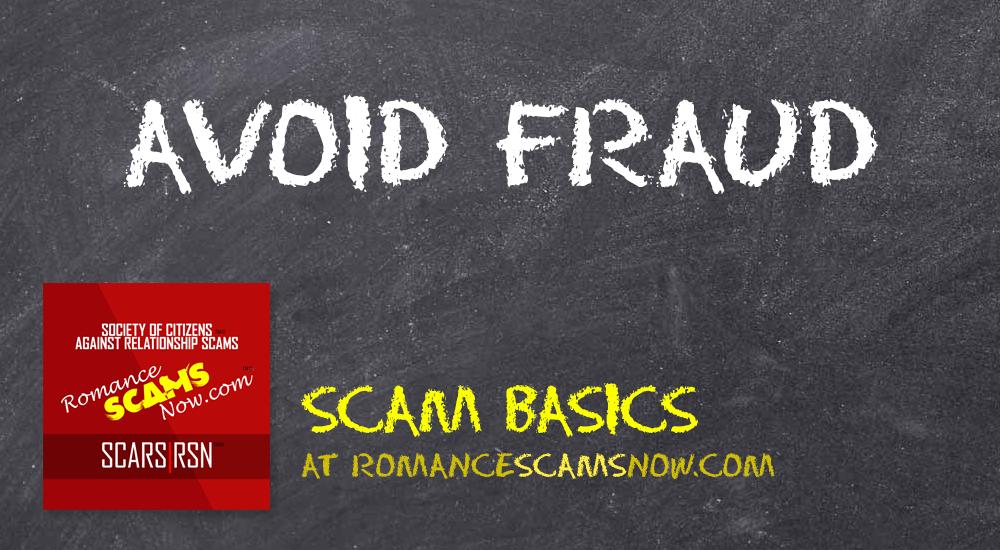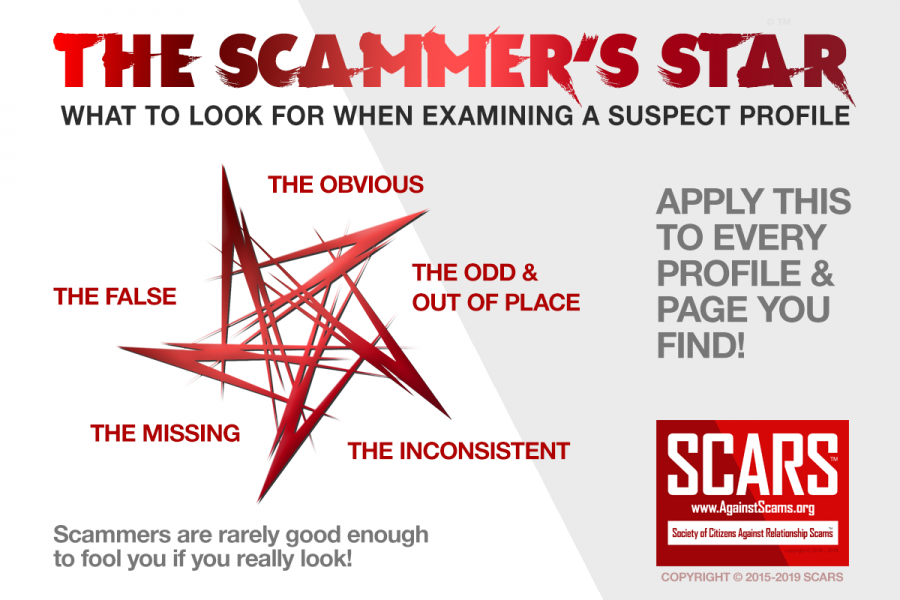
SCARS Institute’s Encyclopedia of Scams™ Published Continuously for 25 Years

SCARS™ Scam Basics: Scammer Acid Test
Most Scams Follow Similar Patterns Of Behavior By The Scammer
HERE ARE A FEW COMMON TACTICS/BEHAVIORS/STRATEGIES SCAMMERS USE
Always be on the lookout for these warning signs that could identify a scammer.
The Basic Scam “Acid” Test:
PICTURE PROBLEMS
Is the person’s photo original? Use an image search tool like Google Images and/or Yandex to see if the same photo appears on many other websites, possibly under different names. If it does appear in many places, it suggests the photo might be stolen and the person may not be who they say they are. Want to make sure their still photos are legit? Ask your online sweetie to take a verification photo holding a sign with YOUR name. If they refuse that is a RED FLAG
NO VIDEO / LIMITED VIDEO / RECORDED VIDEO
Challenge your online partner to communicate via FaceTime or Skype so you can actually see who you are talking to in real-time. Then see what they say. Always include a specific test such as ask them to say “Hippopotamus” (because you can easily recognize the facial movements if the audio is out of sync. If they make excuses for weeks about why they cannot chat with you via video, that is a RED FLAG
WHAT DID YOU SAY?
If the person you’re seeing online claims to be native to a certain region or country but has a very different dialect or accent, that is a RED FLAG
BON VOYAGE
A common tactic used by scammers is claiming they quickly need to leave the country or want to come to you. Many online scammers are overseas to begin with, and this provides a convenient explanation of why they cannot meet you. If they are serious about meeting you they have to have several things:
- PASSPORT
They must have a passport, ask to see it. Is it the same as your country? Ask to see the entry and exit stamps – for your country and where they are att – out of curiosity. - ISSUED VISA
If they have a passport from another country, especially a non-European country ask to see their U.S. Visa. You can look up online which countries require a VISA to get into your country. - NEED A VISA
If they need a VISA, such as for the U.S. there is a process and it is not fast. If they say that they can get a visa in a few days – always ask to see a copy of the VISA request documents, but a U.S. Visa can take months. - YOU CAN CONTACT YOUR CONSUL
In any country, your Country has a Consulate. You can contact them to check on their Visa status and application. You will find the email address of almost all Consuls online.
LOCAL PHOTOS
If they have a phone, they have a camera. Ask them for photos showing them doing normal things. Especially in front of their hotel – showing the name. Go online and find the hotel’s website for comparison. If they do not it’s a RED FLAG
EMERGENCY – NEED HELP NOW!
The person claims of legal trouble or other crises that require emergency funding should be met with skepticism ALWAYS. “Send money to get me out of jail” is a classic scam tactic for someone preying on your emotions. “Send money because I lost my wallet” and “Send money because I lost my passport and cannot get home” are other common warning signs of financial schemes to defraud you of money. In cases like this, ask them to contact their Country’s Consul to Contact you and offer to send the money THROUGH the Embassy – yes you can do that!
HEAD OVER HEELS IN LOVE ON DAY 5
Moving the relationship along very quickly should be a warning sign for online relationship. The faster a scam artist can proclaim his love and convince a victim to become emotionally invested, the sooner he can start asking for money. This is something called the Amygdala Hijack » and it works to trigger your own brain to help the scammer. Real relationships take time.
IT JUST DOESN’T ADD UP
The more questions you ask, the more information you’ll get to see if you can verify if your online Romeo or Juliet is telling the truth. Where can I send you a letter? Where do you work and what is your job title? Those are easy questions that should elicit quick responses that you can then search online to see if the answers make sense. Always insist on a mailing address, so you can “send them a surprise.” Every hotel can receive mail, and international airmail takes a week or less. If they will not it’s another RED FLAG
SCAMMERS ARE EASILY OFFENDED
Scammers or fraudsters are clever and will gaslight their potential victims, trying to make them feel guilty for asking tough questions.
IT ALWAYS COMES DOWN TO THE MONEY
Online scammers are out for one thing: making money at any cost. So your finances and the size of your bank account is a big deal to them. If some of the initial conversations you have with an online prospect include questions about whether you own your own home, how much you earn, or how much you have in savings, that could be a sign they are fishing for information to determine if you are worth their time.
KEEP IT SECRET – JUST BETWEEN US
Scammers will frequently ask their victims not to tell others about their relationship. They will also try to get you to communicate via personal email and text, away from the online dating sites where they can continue to look for more potential victims.
THEY SAY “I’LL PAY YOU BACK”
No, they won’t. Scammers in foreign countries do not send refund checks to their victims. Once the money is gone it is gone.
GIFT CARDS
Scam artists want money and items of value — any items of value. Asking you to wire money should be the most serious warning sign of an online scam. But asking for computers and gift cards is also very popular because they have instant value. A good rule of thumb: do not EVER send money, send items of value, or provide personal information such as your banking information or Social Security number to someone you have only met online.
ACCESS YOUR BANK ACCOUNT
Scammers are having more problems getting their money than before. Now they ask for access to your bank account to send money to you, so it can be forwarded to them. It seems innocent, but it is a crime and you could go to jail for money laundering. Plus you will owe taxes on every cent that flows through your account.
PLEASE SHARE OUR ARTICLES WITH YOUR CONTACTS
HELP OTHERS STAY SAFE ONLINE
SCARS™ Team
A SCARS Division
Miami Florida U.S.A.
TAGS: SCARS, Important Article, Information About Scams, Anti-Scam, Scam Basics, Scammer Acid Test, Detecting Scams, How To Identify A Scam, Is It A Scammer,
The Latest SCARS|RSN Posts
FIND MORE SCAM NEWS
«SCAMCRIME.COM»
CHAT WITH SCARS™
«CLICK HERE»
END
MORE INFORMATION
– – –
Tell us about your experiences with Romance Scammers in our
« Scams Discussion Forum on Facebook »
– – –
FAQ: How Do You Properly Report Scammers?
It is essential that law enforcement knows about scams & scammers, even though there is nothing (in most cases) that they can do.
Always report scams involving money lost or where you received money to:
- Local Police – ask them to take an “informational” police report – say you need it for your insurance
- Your National Police or FBI « www.IC3.gov »
- The SCARS|CDN™ Cybercriminal Data Network – Worldwide Reporting Network « HERE » or on « www.Anyscam.com »
This helps your government understand the problem, and allows law enforcement to add scammers on watch lists worldwide.
– – –
Visit our NEW Main SCARS Facebook page for much more information about scams and online crime: « www.facebook.com/SCARS.News.And.Information »
To learn more about SCARS visit « www.AgainstScams.org »
Please be sure to report all scammers
« HERE » or on « www.Anyscam.com »
Legal Notices:
All original content is Copyright © 1991 – 2020 SCARS All Rights Reserved Worldwide & Webwide. Third-party copyrights acknowledge.
SCARS, RSN, Romance Scams Now, SCARS|WORLDWIDE, SCARS|GLOBAL, SCARS, Society of Citizens Against Relationship Scams, Society of Citizens Against Romance Scams, SCARS|ANYSCAM, Project Anyscam, Anyscam, SCARS|GOFCH, GOFCH, SCARS|CHINA, SCARS|CDN, SCARS|UK, SCARS Cybercriminal Data Network, Cobalt Alert, Scam Victims Support Group, are all trademarks of Society of Citizens Against Relationship Scams Incorporated.
Contact the law firm for the Society of Citizens Against Relationship Scams Incorporated by email at legal@AgainstScams.org
-/ 30 /-
What do you think about this?
Please share your thoughts in a comment below!
Table of Contents
- Most Scams Follow Similar Patterns Of Behavior By The Scammer
- The Basic Scam “Acid” Test:
- The Latest SCARS|RSN Posts
- New U.S. Law – S.3643 – 118th Congress – Will Dramatically Impact Scammers and Terrorists – 2026
- How Scam Survivors Can Survive Valentine’s Day – 2026
- U.S. Veterans Benefits Scams – 2026
- New AI Voice Cloning Phone Scams – 2026
- An Essay on Justice and Money Recovery – 2026
- Virtual Kidnapping & Extortion – Proof of Life Images or Videos – 2026
LEAVE A COMMENT?
Thank you for your comment. You may receive an email to follow up. We never share your data with marketers.
Recent Comments
On Other Articles
- on Love Bombing And How Romance Scam Victims Are Forced To Feel: “I was love bombed to the point that I would do just about anything for the scammer(s). I was told…” Feb 11, 14:24
- on Dani Daniels (Kira Lee Orsag): Another Scammer’s Favorite: “You provide a valuable service! I wish more people knew about it!” Feb 10, 15:05
- on Danielle Delaunay/Danielle Genevieve – Stolen Identity/Stolen Photos – Impersonation Victim UPDATED 2024: “We highly recommend that you simply turn away form the scam and scammers, and focus on the development of a…” Feb 4, 19:47
- on The Art Of Deception: The Fundamental Principals Of Successful Deceptions – 2024: “I experienced many of the deceptive tactics that romance scammers use. I was told various stories of hardship and why…” Feb 4, 15:27
- on Danielle Delaunay/Danielle Genevieve – Stolen Identity/Stolen Photos – Impersonation Victim UPDATED 2024: “Yes, I’m in that exact situation also. “Danielle” has seriously scammed me for 3 years now. “She” (he) doesn’t know…” Feb 4, 14:58
- on An Essay on Justice and Money Recovery – 2026: “you are so right I accidentally clicked on online justice I signed an agreement for 12k upfront but cd only…” Feb 3, 08:16
- on The SCARS Institute Top 50 Celebrity Impersonation Scams – 2025: “Quora has had visits from scammers pretending to be Keanu Reeves and Paul McCartney in 2025 and 2026.” Jan 27, 17:45
- on Scam Victims Should Limit Their Exposure To Scam News & Scammer Photos: “I used to look at scammers photos all the time; however, I don’t feel the need to do it anymore.…” Jan 26, 23:19
- on After A Scam, No One Can Tell You How You Will React: “This article was very informative, my scams happened 5 years ago; however, l do remember several of those emotions and/or…” Jan 23, 17:17
- on Situational Awareness and How Trauma Makes Scam Victims Less Safe – 2024: “I need to be more observant and I am practicing situational awareness. I’m saving this article to remind me of…” Jan 21, 22:55
ARTICLE META
Important Information for New Scam Victims
- Please visit www.ScamVictimsSupport.org – a SCARS Website for New Scam Victims & Sextortion Victims
- Enroll in FREE SCARS Scam Survivor’s School now at www.SCARSeducation.org
- Please visit www.ScamPsychology.org – to more fully understand the psychological concepts involved in scams and scam victim recovery
If you are looking for local trauma counselors please visit counseling.AgainstScams.org or join SCARS for our counseling/therapy benefit: membership.AgainstScams.org
If you need to speak with someone now, you can dial 988 or find phone numbers for crisis hotlines all around the world here: www.opencounseling.com/suicide-hotlines
A Note About Labeling!
We often use the term ‘scam victim’ in our articles, but this is a convenience to help those searching for information in search engines like Google. It is just a convenience and has no deeper meaning. If you have come through such an experience, YOU are a Survivor! It was not your fault. You are not alone! Axios!
A Question of Trust
At the SCARS Institute, we invite you to do your own research on the topics we speak about and publish, Our team investigates the subject being discussed, especially when it comes to understanding the scam victims-survivors experience. You can do Google searches but in many cases, you will have to wade through scientific papers and studies. However, remember that biases and perspectives matter and influence the outcome. Regardless, we encourage you to explore these topics as thoroughly as you can for your own awareness.
Statement About Victim Blaming
SCARS Institute articles examine different aspects of the scam victim experience, as well as those who may have been secondary victims. This work focuses on understanding victimization through the science of victimology, including common psychological and behavioral responses. The purpose is to help victims and survivors understand why these crimes occurred, reduce shame and self-blame, strengthen recovery programs and victim opportunities, and lower the risk of future victimization.
At times, these discussions may sound uncomfortable, overwhelming, or may be mistaken for blame. They are not. Scam victims are never blamed. Our goal is to explain the mechanisms of deception and the human responses that scammers exploit, and the processes that occur after the scam ends, so victims can better understand what happened to them and why it felt convincing at the time, and what the path looks like going forward.
Articles that address the psychology, neurology, physiology, and other characteristics of scams and the victim experience recognize that all people share cognitive and emotional traits that can be manipulated under the right conditions. These characteristics are not flaws. They are normal human functions that criminals deliberately exploit. Victims typically have little awareness of these mechanisms while a scam is unfolding and a very limited ability to control them. Awareness often comes only after the harm has occurred.
By explaining these processes, these articles help victims make sense of their experiences, understand common post-scam reactions, and identify ways to protect themselves moving forward. This knowledge supports recovery by replacing confusion and self-blame with clarity, context, and self-compassion.
Additional educational material on these topics is available at ScamPsychology.org – ScamsNOW.com and other SCARS Institute websites.
Psychology Disclaimer:
All articles about psychology and the human brain on this website are for information & education only
The information provided in this article is intended for educational and self-help purposes only and should not be construed as a substitute for professional therapy or counseling.
While any self-help techniques outlined herein may be beneficial for scam victims seeking to recover from their experience and move towards recovery, it is important to consult with a qualified mental health professional before initiating any course of action. Each individual’s experience and needs are unique, and what works for one person may not be suitable for another.
Additionally, any approach may not be appropriate for individuals with certain pre-existing mental health conditions or trauma histories. It is advisable to seek guidance from a licensed therapist or counselor who can provide personalized support, guidance, and treatment tailored to your specific needs.
If you are experiencing significant distress or emotional difficulties related to a scam or other traumatic event, please consult your doctor or mental health provider for appropriate care and support.
Also read our SCARS Institute Statement about Professional Care for Scam Victims – click here to go to our ScamsNOW.com website.


















![To Be A Scammer? An Overview Of Scammers Fraudsters & Online Con Artists - 2024 [UPDATED] what is a scammer what-is-a-scammer](https://romancescamsnow.com/wp-content/uploads/2021/10/what-is-a-scammer.png)
![New Research Study on Stolen Valor - Military Scams - STUDY NOW COMPLETED [UPDATED] Military Impersonation Research Study New Research Study on Stolen Valor - Military Scams](https://romancescamsnow.com/wp-content/uploads/2022/03/Military-Impersonation-Research-Study.png)







My mother is still actively participating in one of these scams, she has spent the life insurance she got from my fathers death, she has taken a mortgage on her house, she has sold her commercial property she had , and is now living month to month on her pension check, and tries to hide her communications with this scammer. I don’t know what to do! She has spent at least a half million in the past two years, she sold the building my sisters business is in , for $150k two months ago, and that is already gone. How can I report this to the athoraties?, I think she might listen to someone in an official capacity, anyone in the family, she doesn’t believe knows what we’re talking about.